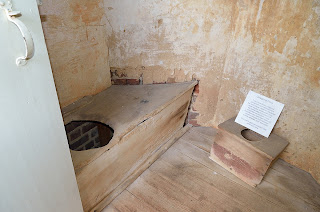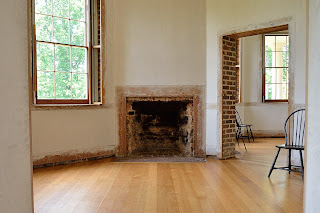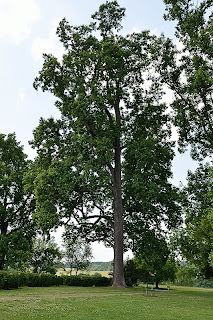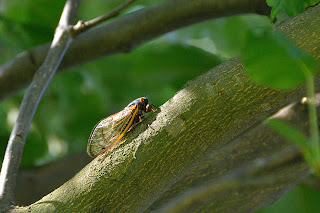
While Margot and I were in Virginia we took a drive on Saturday afternoon to Lynchburg. Our objective was to visit Poplar Forest.
Thomas Jefferson owned Poplar Forest for about 53 years. Jefferson designed the house and grounds using many of the same principles he used in the design of Monticello, the Virginia State Capitol and the University of Virginia.
The house in being restored to reflect as accurately as possible the way Jefferson designed it. The work is continuing and it is sort of neat to see behind the walls - so to speak. Jefferson started construction of the house in 1806.
I was only able to sneak one decent shot of the interior of the property
The house is in a perfect octagon and very symmetrical. Even the grounds are symmetrical. Jefferson incorporated many of the most modern design features that he observed in Europe during his travels there.
This is a picture of one of the Poplar trees from Jefferson's time. Another recently blew over and they took the opportunity to count the rings to confirm the age.
Jefferson and his wife inherited the property from his father-in-law in 1773. Originally the property was about 4800 acres. Jefferson kept a significant number of slaves there to operate the farm. The farm was about 80 miles from Monticello, Jefferson main home, and to some extent were operated jointly.
The property included 2 necessaries, privies, or outhouses as you prefer. Again they were same distance from the house, octagonal, and symmetrically situated. All the brick for the house and privies was hand made by slaves on the property. The octagonal shape required 5 sided bricks for the corners.
Jefferson didn't spend much time here for the first 25 years or so of ownership. He built the house as a getaway from a constant parade of visitors at Monticello. He spent much more time here after his presidency. Jefferson and his family spent 2 months at the farm 1781 to evade capture as the British marched toward Monticello during the revolution.

This is the inside of the privy. This is allegedly the original seat. The child's seat was added later.
So, yes, Thomas Jefferson shat here.
There is a wealth of information at the website of the foundation that is restoring the place.
www.poplarforest.org
The wing you see was added by Jefferson relatively late in his life. It contained a kitchen, storeroom, etc.
The house in the background post dates Jefferson's time and was a caretaker's home. Jefferson gave the property to his grandson who sold it 2 years after Jefferson's death. I was in private hands for 150+ years.

Ok. Here are a couple of pictures without a home. This flowers (I don't know the name) open in the sunshine and close in the shade.
I thought they were pretty. They also have a bumblebee on them which has been sort of a theme recently.
Click to enlarge.
Vinton, Virginia is suffering through one of the 17 year Cicada infestations. The noise is incredible. I likened it to something out of the Twilight Zone.
Margot thought is more like something out of Steven King's "The Langoliers" who are cleaning up the past by eating it.
They don't seem to be damaging the trees from what I could see.
Here are links to earlier Virginia an South Carolina links.
Blue Ridge Parkway
Lake Keowee





This is incredible, 4800 acres of land? All the man power to keep that farm alive is crazy
ReplyDelete-Tony Salmeron
It is pretty amazing - that is 7.5 square miles. I guess slavery was the only way to keep such a big farm back then. I don't imagine the economics work if you are paying for help. Especially since under the slavery system, everyone worked - men, women and children.
DeleteHappened upon your blog and thoroughly enjoyed this post. I recently read America's First Daughter. Portions took place at Poplar Forest which I was not previously aware of.
ReplyDelete